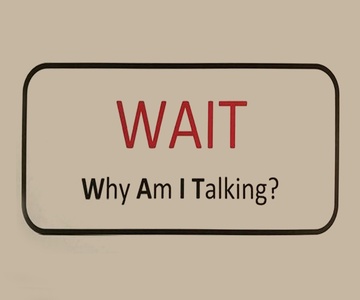WAIT – Why am I talking?

We’ve often heard the quote “Silence is golden.” Or, to put it more indelicately, “Shut up!”
As a Career Coach, my job is to help people create what they will say in networking or interviewing situations. By the time we have practiced together, the messages should roll off the tongue easily and be powerful, and effective in impressing the listener. Brilliant, even.
As a speaker and writer, words are my tools. I seldom stop to think that silence is also a tool. So here are some ways you can use silence to make your career strategies even more powerful:
1. Take a moment to process what you’ve heard. When a recruiter calls and gives you lots of information about a position, you may not even be able to take sufficient notes! It’s smart to hold back a little and to remind yourself to ask questions, rather than express your excitement. This accomplishes two things: first, you are holding yourself as a professional who is being sought after. Secondly, you have the opportunity to really think about whether the job is appropriate for your skills.
2. Be silent, breathe, and really listen to the question. In my work as a presentation skills coach, the president of a construction company told me an interesting story. In an interview with the board of directors who had the power to give the company a contract, one of the board members asked, “Where did you go to high school?” My client interpreted the question as a challenge to his education and immediately launched into his college degree and post-college training. Later, he learned the board member was from a small town in Texas and suspected that he had been her classmate in high school! Sometimes in a job interview, or in working with clients, you might get a strange question. Rather than feeling challenged, it’s best to just answer the question. Or, you can say, “Why do you ask?”
3. Let your own words really have an impact. One of the best strategies for a successful interview is to have a series of STAR stories prepared that describe how you do business. Rather than tell someone “I’m a people person,” you provide proof that you are a people person with a short story. After telling a dramatic or impactful story, it’s important to pause and give your interviewer an opportunity to think. The more dramatic the story, the more time it will take. This technique is used in acting in order to make an important line in the script stand out. In order for you to stand out as a jobseeker, pause after your best lines.
4. Keep the interview moving forward. Most recruiters have a short time frame. Sometimes, there are as many as 20 required questions! Keep your answers short, concise and friendly.
5. Less is usually more in conversation. My brother was a Jesuit priest, who had a small parish in rural Iowa. He had dozens of elderly parishioners in nursing homes scattered around three towns. Father Paul was a master of the short conversation. When he went out to do nursing rounds, his visits rarely lasted more than 15 minutes each. During that time, he was truly present with his parishioner, listening for what they had to say. And then carefully responding to their concerns. He was universally admired, not because of what he said, as much as his loving presence in those situations. We would all do well to nurture the idea of being fully present, saying less, and listening more.
6. Put a WAIT sign on your wall. WAIT stands for the quote: “Why am I talking?” Let it remind you that listening, whether in personal exchanges, in client meetings, or in a job interview, is a great idea. My sign is up. Are you ready to join me?
On your side,
Catherine Jewell
The Career Passion® Coach
PS: My sincere thanks to Rainmaker Strategies for inspiring this post. If you are a business developer, you can sign up for their excellent newsletter here.
Categories: Career Coach , Career Coaching , Career Counseling , Career Strategy , Career Testing , Electric Kitchen Composter , Food Waste Composting Machine , Home Essentials , Interview Preparation , Job Search Help , Resume Branding Statement , Resume Writing , Salary Negotiations